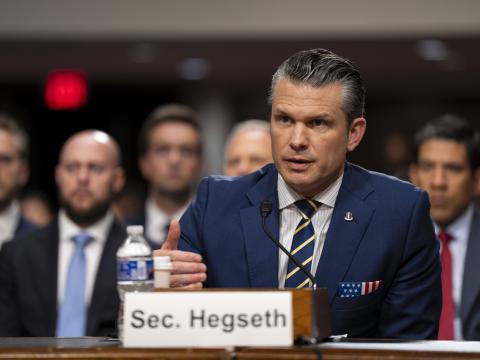CONFLICTED
Several intelligence issues worthy of examination and discussion emerged in August. There's the NIE on the "Prospects for Iraq's Stability;" the Foreign Surveillance debate between the Congress and the DNI; and the Congressionally mandated release of CIA's Inspector General's 2005 report on the Agency's performance pre 9-11.
Several intelligence issues worthy of examination and discussion emerged in August. There’s the NIE on the “Prospects for Iraq’s Stability;” the Foreign Surveillance debate between the Congress and the DNI; and the Congressionally mandated release of CIA’s Inspector General’s 2005 report on the Agency’s performance pre 9-11. Each alone deserves more attention than the short and shallow treatment I can give them in a venue like this.I suppose it’s a reasonable view of reality, but I am wondering what the intelligence value is to policy makers of an NIE that seems to say that the military surge is working but Iraq is apparently incapable of taking advantage of the improving security situation to establish a unified government. Sounds like a case for leaving to me, but then the NIE concludes that chaos is the likely outcome of a precipitous departure of U.S. troops without some other security force filling the vacuum. I suppose the intelligence value of this NIE is that the IC sees little likelihood of the political situation changing regardless of how successful the surge is militarily. Ouch! Of course it was an NIE that assured the President and the Congress that Iraq possessed Weapons of Mass Destruction (WMD), so maybe they have this wrong too!Related to this NIE is the foolish (to me) debate about giving the enemy a date certain for our military withdrawal from Iraq. Right now the date is 20 January 2009 when the 44th President of the U.S. takes office, and everybody seems to know it except those responsible for U.S. Iraq policy and callers to the Shawn Hannity radio program. In my view, those favoring not giving Al Qaeda a date certain could best achieve that aim by a starting a military withdrawal from Iraq before the next presidential inauguration. The thought of eventually returning to a Northern/Southern Watch like military strategy for Iraq is just too ironic (and sad) considering the missed opportunity and cost in blood.Speaking of conflicted – that’s me when it comes to NSA surveillance to find terrorists on the one hand and protecting American citizens from unreasonable government intrusion on the other. Seemed like a no brainer when DNI Mike McConnell said the IC in general and NSA in particular needs legislative relief to intercept and exploit communications between two non-U.S. persons both overseas but whose communications pass through servers on American soil. If you have not seen DNI McConnell’s Q&A interview in the El Paso Times regarding the Foreign Surveillance/FISA debate its worth checking out at http://www.elpasotimes.com/news/ci_6685679 . According to the DNI, foreign surveillance is targeted and warrants are sought whenever U.S. persons are detected in intercepted conversations, but as I read through this interview I increasingly found myself empathizing with those concerned about NSA “data mining” and sweeping up the phone calls, emails and faxes of ordinary citizens. Didn’t J. Edgar Hoover keep telephone wire tapes of government officials to protect both himself and the FBI?! So it would seem a fair question is: what kind of oversight is needed to insure that NSA in searching for foreign communicants abroad using US based infrastructure does not lapse into data mining telephone companies (TELCOs) and internet service providers (ISP). If that question was resolved in the rush to pass the Foreign Surveillance/FISA Legislation before the Congress left for its summer recess, I missed it.Wow, what a hatchet job by the CIA IG on George Tenet and the head of Counter-Terrorism Center on their pre 9-11 performance. I wonder if there is anything in the IG’s records showing that they noticed this flawed behavior at CIA in near real time and reported it to Director Tenet or the Congressional Committees of Jurisdiction. Could Director of Central Intelligence (DCI) Tenet have more effectively wielded his authorities across the IC to get better performance? Of course, he could have, but nobody wanted him to do that and in fact the Secretary of Defense and Director of the FBI would have actively resisted such assertions of authority as unneeded meddling in their organizations. Now we have a DNI with authorities from the Intelligence Reform and Terrorist Prevention Act (IRTPA) that says we want the DNI to run the IC as a coherent enterprise, but are we as Americans really comfortable with a centralized (you know “Big Brother”) model vice the weaker diffused model provided for in the National Security Act of 1947 (60th Anniversary this September!) and engaged in competitive analysis as called for in Executive Order 123333 of December 4, 1981? I also enjoy too much that Mike Hayden as the Director of CIA is now an avid consumer of the kind of SIGINT he used to deny to the rest of the IC as DIRNSA.To summarize, I see the Iraqi NIE as the IC wanting to have it both ways (we should go, but we can’t leave); the Foreign Surveillance/FISA legislation as necessary but endangering civil liberties (now that’s me wanting to have it both way!); and the CIA IG failing to notice that it did not execute its own oversight responsibilities pre 9-11. What do you think?joemaz




Comment
My first introduction to some
Conflicted is a good word for
Comments